Murder victim Jane Thurgood-Dove denied justice, say parents
ONE of Jane Thurgood-Dove’s killers almost certainly got away with murder because police diverted resources to the underworld war, top ex-cop and parents say. PLUS: Book extract
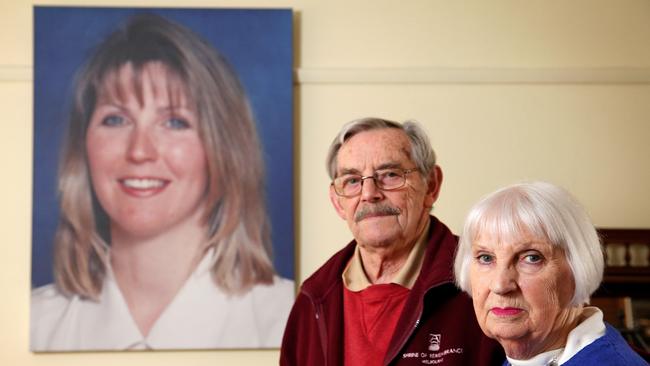
True Crime Scene
Don't miss out on the headlines from True Crime Scene. Followed categories will be added to My News.
ONE of Jane Thurgood-Dove’s killers almost certainly got away with murder because Victoria Police diverted most of its resources to fighting Melbourne’s underworld war.
Former homicide detective Ron Iddles believes he may have been able to arrest one of the suspects if he had got the electronic and physical surveillance he asked his bosses for.
No charges were ever laid over the 1997 execution of Ms Thurgood-Dove, 34, a Niddrie mother of three.
She was shot dead in her driveway in front of her three children by a bungling hitman who murdered her instead of the target he was paid to kill — the wife of a criminal who lived in the same street, drove a similar car and who looked like Ms Thurgood-Dove.
That suspected hitman, bikie Stephen Mordy, is dead but there is still a $1 million reward available to anyone with information.
The lack of resources for the Thurgood-Dove probe disgusted her parents, John and Helen Magill, and they made a formal complaint to Victoria Police.
Mr Magill was aware an informer had nominated criminal Jamie Reynolds as one of those involved in assisting Mordy and that Sen-Sgt Iddles had asked for electronic and physical support services to assist his investigation.
He was also aware Victoria Police had refused to provide those resources to gather evidence against Reynolds and hopefully identify a second man who drove the getaway car on the day of the murder.
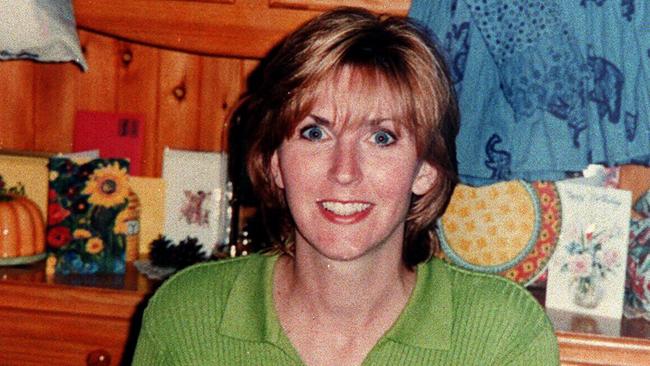
“Had I got the resources, there’s no doubt I would have done a considerable amount of work on Reynolds,” Sen-Sgt Iddles said. “I was in a holding pattern for nine months.”
Reynolds died in a boating accident in that time.
John and Helen Magill yesterday told the Sunday Herald Sun they were angered and saddened by the decision of Victoria Police bosses to give priority to the Purana gangland killing taskforce when deciding who got what resources.
“Purana sucked the homicide squad dry, putting various investigations on the backburner,” Mr Magill, 82, said.
“How those at the top of Victoria Police could give more attention to investigating crooks killing other crooks ahead of the murder of innocent people like Jane is beyond me. My family has been diabolically let down by the force and the state government.
“We never got justice for her. Jane’s killer, those who helped him and the man who paid for the hit all got away with murder.”
Mrs Magill, 80, said Ms Thurgood-Dove’s widower Mark had done a remarkable job of raising their three children after her death.
“All three have grown up to be lovely people, thanks to their father,” Mrs Magill said.
Anyone with information should contact CrimeStoppers on 1800 333 000 or crimestoppers.com.au
SUNDAY EXTRA: The unsolved murder of suburban mum Jane Thurgood-Dove remains one of veteran homicide detectives Ron Iddles’ greatest regrets, but he knows what happened.
What follows is an extract from A new book on the life and career of Sen-Sgt Iddles — The Good Cop, by Justine Ford — revealing the inside story of the Thurgood-Dove investigation.
PAYBACK GONE WRONG
WHY shoot this suburban mum? Ron Iddles wondered. Was it a domestic dispute? Or was there more to Jane Thurgood-Dove than met the eye?
At least two people, including a schoolgirl and a woman who lived nearby, had witnessed the shooting of the 35-year-old mother of three in her driveway in Niddrie in Melbourne’s north, so the first uniformed officer at the scene was able to give Ron a reasonably detailed briefing.
“He said apparently Jane had driven into the driveway in her early-model Toyota Landcruiser with her three kids in the car — Scott, who was 11, Ashley, who was six, and Holly, aged three,” Ron said. “A Holden Commodore then drove into the driveway and the passenger got out.
“He was wearing sunglasses and a beanie, was scruffy and slightly overweight.”
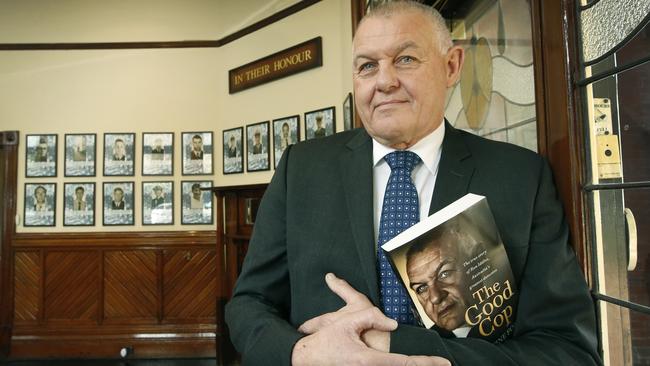
Jane started running frantically around her car, circling it at least twice until she fell over.
Her pursuer — who was armed — had her cornered. “At that point the gunman fired two shots into the back of her head. He then ran back to the car, which sped off,” Ron said. Jane Thurgood-Dove’s children saw everything.
Straight away, Ron sent a colleague to the factory where Mark Thurgood-Dove (Jane’s husband) worked as a foreman.
“One, to see if Mark was at work and two, to find out — if he was there — if he’d had the opportunity to leave,” Ron said. He quickly learnt that Thurgood-Dove had been at work all day.
A short while later, Mark Thurgood-Dove arrived, giving Ron the opportunity to talk to him.
“He told me he would ring Jane from work every day to see how she was going, but that day, he didn’t call,” Ron said. “They’d had an argument the day before over a personal issue and he’d decided he wouldn’t ring.”
Ron says as a detective he would normally have found that odd but he and his colleagues were satisfied because he had been at work all day and could not have pulled the trigger.
“But we weren’t satisfied at that stage that he hadn’t contracted someone else to do it,” Ron said.
In an effort to find out more about Jane Thurgood-Dove’s life, the detectives continued speaking to those closest to her, including her sisters, Susan and Sandra. That’s when the case started hotting up.
“Susan said that about 10 days before the murder, she visited Jane, who was somewhat stressed,” Ron said.
“She asked what was wrong but Jane said, ‘I can’t tell you’. When Susan asked why, Jane said, ‘If I told you, you’d never ever understand’.”
So Jane Thurgood-Dove had a secret. One she couldn’t tell her sister, who was close to her, Ron thought. Rummaging through Thurgood-Dove’s handbag, the investigators found a clue.
“In Jane’s handbag was a card from a police officer,’ Ron said. “It had his name on it and he worked at an inner Melbourne police station.”
A member of Ron’s crew paid the policeman a visit and asked how he knew Thurgood-Dove.
“He said he knew John, Jane’s dad, because he ran a stall at Moonee Ponds market where he bought his meat,” Ron said.
“He’d also lived with Jane’s sister, Susan, who he was in a relationship with for two years.
“On top of that, Thurgood-Dove cleaned the policeman’s house to boost the family income.”
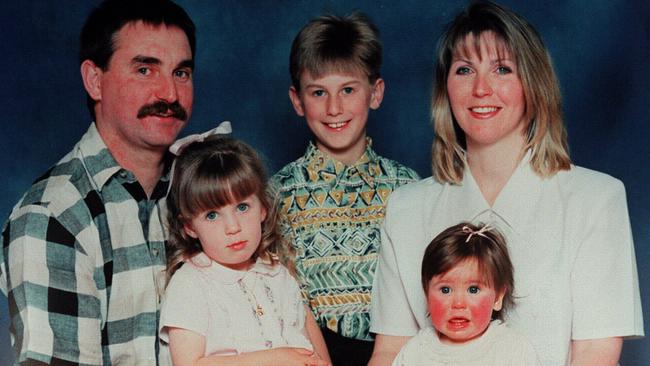
Ron says the policeman made a written statement saying he’d last spoken to Thurgood-Dove about a week before her murder. He’d phoned her while he was on night shift and she was cleaning his house.
“He said he spoke to her for about a minute, but he was tired and didn’t want to keep talking,” Ron said.
“But when we checked the phone records we found out that the call went for a lot longer than that.”
This gave Ron new questions to ponder: Was the police officer simply mistaken, or not being open with the facts.
The police doorknock also revealed that a young man had heard a fiery argument at the Thurgood-Doves’ place.
“Now we had a situation,” Ron said.
“Mark (Jane’s husband) had had an argument with Jane on the Saturday, he didn’t call her on the day she died, she had a secret she couldn’t share with anyone, and there was a policeman who’d either not been truthful or was mistaken about the time he spoke to Jane.”
Ron decided it was time to take the investigation to the next level.
“I made the decision that both Mark and the police officer would have to be interviewed formally because I felt that was the proper process,” Ron said.
But after Ron phoned the policeman, the senior constable’s solicitor intervened. Ron explained he wanted to interview the officer because the Homicide Squad had uncovered concerning information. The interview was arranged, but it was of no help to the investigation.

“The police officer adopted his right to silence,” Ron said.
“On advice, he made no comment. He also refused to participate in a line-up and refused to give his DNA for the purposes of elimination.
“While the policeman was at the Homicide Squad I took out a warrant to search his house.”
What he saw startled him.
“The mantelpiece was virtually a shrine to Jane,” Ron said.
“Also, the code to his mobile phone, which we took possession of, was Jane’s date of birth. It was a similar situation with his computer.
“Not only that, but he had changed his will and wanted to be buried beside her.”
There was no doubt in Ron’s mind that Jane Thurgood-Dove was more than a cleaner to this man.
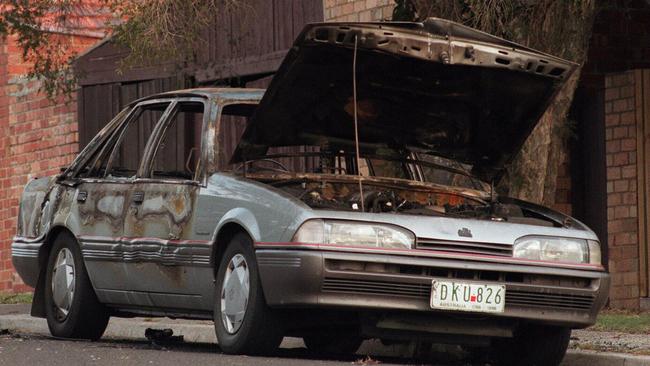
“From that point on, he remained a suspect and we worked hard to eliminate him,” Ron said.
“Out of the blue I got a call from the policeman saying, ‘I want to see you’.
“The policeman told me he’d been having an affair with Jane for about three years. That it had continued probably right up until three or four months before her murder.
“That he actually loved her and felt aggrieved that no one considered his feelings.”
A while later, Ron decided to interview the policeman and Mark Thurgood-Dove again, arranging for them to both come into Homicide on the same day.
“The purpose of that was to offer them a polygraph test,” he said.
It would be the first time Australian police would allow a lie-detector test to be conducted and even though Ron knew the results could not be presented in court, he believed it was a helpful investigative tool.
“Polygraphs are good to eliminate the innocent,” Ron said.
Ron explained to both men they did not have to sit the test.
“I explained to them it was a win — win situation: if you pass the test, you’ll never hear from me again, and if you fail, it isn’t admissible in court,” Ron said.
Mark Thurgood-Dove took the test first. He passed. Not so the police officer. Both men were told of the results and, according to Ron, the policeman took it badly.
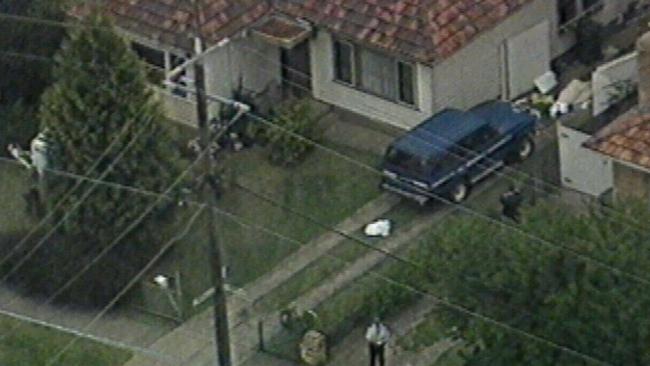
The policeman did not want to appear in a line-up so Ron decided to devise another way for the witnesses to get a good look at him.
So, without him knowing, Ron surreptitiously arranged for the officer to go to a public place where the girl and the woman who’d witnessed Jane Thurgood-Dove’s murder could clearly see him.
“At the end of the process they were both asked if they had seen anyone in the last two hours who looked like the gunman,” Ron said.
Both said they had not.
“So this was the situation: we knew that the policeman had not been upfront about the length of his phone call, he was in love with Jane, he’d been in a relationship with her, he had no alibi on the day of the murder and he failed the polygraph,” Ron said.
“Even though there were facts to support that the police officer was involved, my gut said he wasn’t.
“On a whiteboard we had reasons why it could have been him, but looking at it rationally, why would he get someone else to do it? Why not do it on his own?
“If he was in a relationship with her, why not do it while she was cleaning his house?
“And then there was the question: if he loved Thurgood-Dove so much, why would he want to do it at all?
“So about two to three years into the investigation I undertook a covert operation in the hope of getting new evidence against the police officer or proving his innocence.”
He cannot go into the detail, as it would reveal police methodology, but it certainly did not point to the police officer’s involvement in any way.
Years went by and Ron was unable to crack the Jane Thurgood-Dove case, but not for want of trying.
Then in 2003, Police Commissioner Christine Nixon announced a $1 million reward for information about her murder.
On the day the seven-figure sum was announced, Ron received a phone call at Homicide from a man who said: “I’ve only ever met you once. I know what happened. I’m not going to be greedy. I only want $100,000. The actual gunman is dead. He cocked it up. He shot the wrong person and was never paid for the job.”
The informer told Ron the gunman’s name was Stephen Mordy, who was connected to a bikie gang in Geelong. He also inferred that a man named Jamie Reynolds — who was also connected to Geelong bikies — had helped steal the cars. He only had a nickname for the getaway driver.
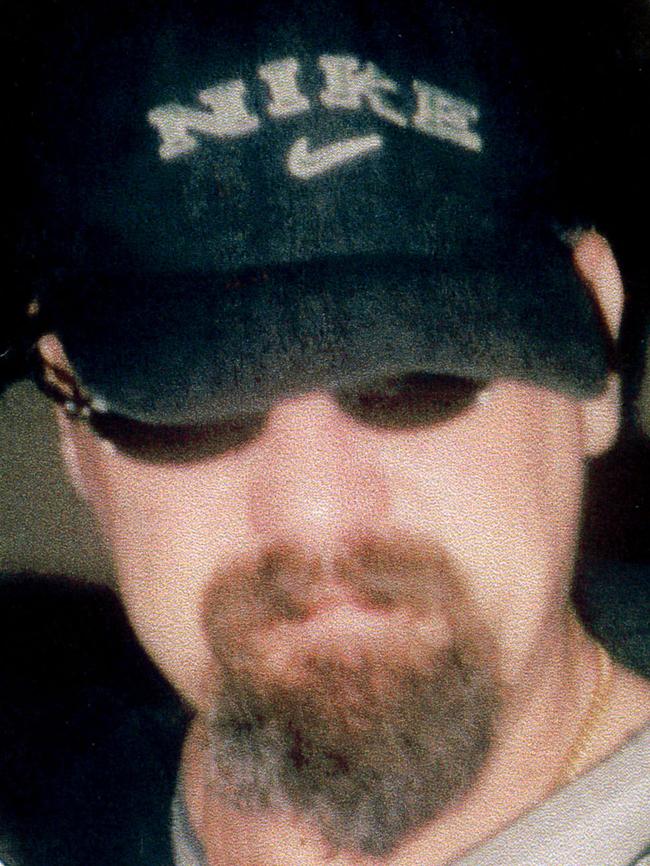
Back at Homicide, the detectives scrutinised the new information and found that Stephen Mordy was indeed dead. The detectives also identified the alleged car thief, Jamie Reynolds.
Ron’s next step was to speak to a contact from Geelong — an old-style crook in his sixties who had spent time in jail and knew who was who in the criminal underworld. “He confessed to me that Jane’s murder was a case of mistaken identity, that it was meant as payback for a man who lived in Muriel Street who had a criminal record,” Ron said.
“He indicated it was meant for the criminal’s wife.”
As the pieces of the puzzle finally appeared to fall into place, the Homicide Squad was at its busiest ever, investigating Melbourne’s now infamous gangland war. It meant that Ron couldn’t use the technical and specialist resources normally available to him because they were being monopolised by Taskforce Purana, set up to investigate a string of underworld murders.
Ron wanted to kickstart another investigation around the alleged car thief, Jamie Reynolds, and find out the getaway driver’s real name. But he was stymied.
“While the investigation was on hold, Jamie Reynolds drowned in 2004 in a boating accident,” Ron said.
The situation disgusted Thurgood-Dove’s dad, John Magill, who challenged senior executives at Victoria Police.
“He was upset that more resources were going into finding out who had killed criminals rather than his daughter, who had never been in trouble with police,’ Ron said.
As time went by, Ron was able to identify a man he thought might have been the driver, but there was not enough evidence to lay any charges.
Ron spent well over a decade investigating Jane Thurgood-Dove’s murder but, much to his chagrin, he didn’t crack the case.
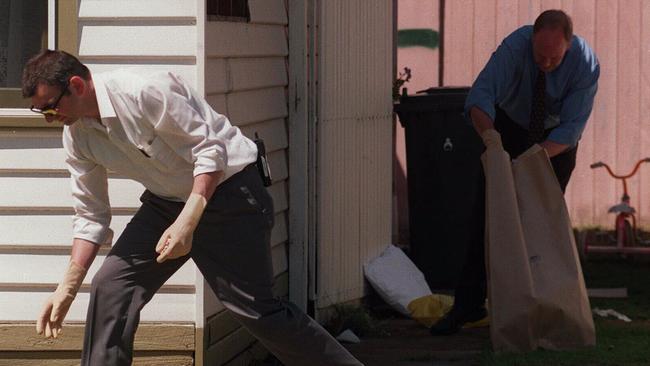
Had the investigation been adequately resourced throughout, the outcome might have been different, but Ron isn’t one to speak in what-ifs.
He knows that none of those closest to Thurgood-Dove arranged for her to be killed. “Her husband, Mark, passed the polygraph test, which indicated he was in no way involved,” Ron said.
“The police officer was also eliminated and, on the information I have, Mordy did it.”
So that makes the most likely scenario, according to Ron, that the murder was a case of mistaken identity but with key players dead, including the gunman, and no evidence of who arranged the hit, the case remains unsolved, and the $1 million reward still stands.
• The Good Cop by Justine Ford. Published by Pan Macmillan, $34.99.


